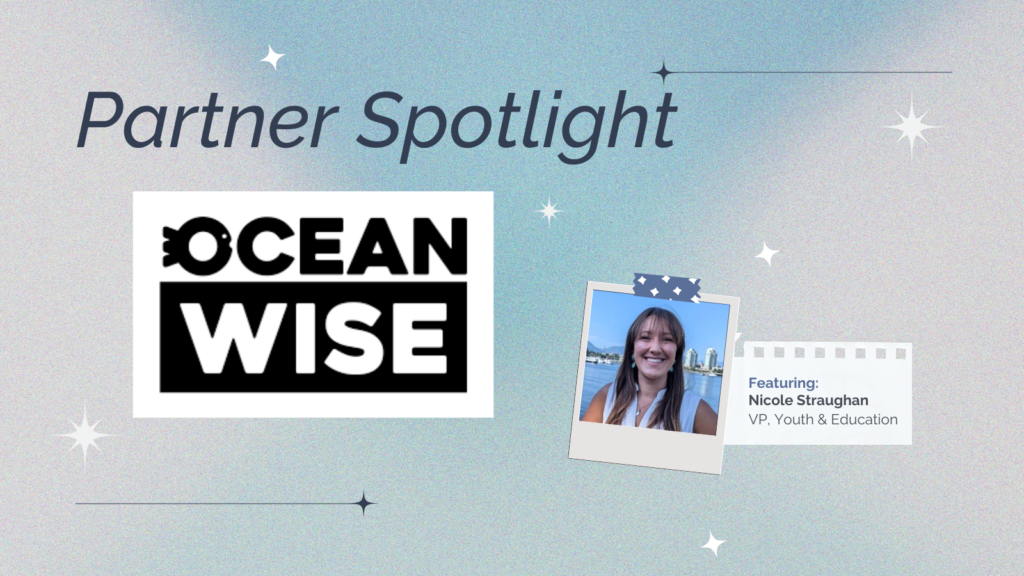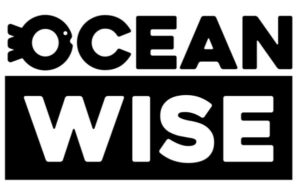Partner Spotlight: Ocean Wise

Youth Leadership in Ocean Conservation
We asked Nicole Straughan, Vice President of Youth & Education at Ocean Wise a series of questions to delve into her efforts empowering young leaders who are passionate about ocean conservation.
Nicole offered invaluable insights into the intersection of ocean conservation and climate action, highlighting the pivotal role and opportunities for youth in addressing these urgent issues. Additionally, she shed some light on skill gaps within the industry and outlined diverse pathways for youth who are looking to build capacity and break into this sector. Nicole also dispelled common misconceptions and what she wishes more people knew about ocean conservation!
Q: What are some common misconceptions about ocean conservation?
In my work in education and youth development, I often meet young people passionate about the ocean, who want to pursue a career in ocean conservation, and think their only option is to go into science and academia.
But there are so many pathways young people can take to a career in ocean conservation. Yes, we need scientists and field biologists, but we also need entrepreneurs, fundraisers, communicators, business administrators, engineers, graphic designers, educators. I am a firm believer that no matter what the experience or education a person brings with them, there is a space for them in the ocean conservation sector – we are better when we have people with diverse perspectives and skill sets come together to solve the major challenges facing our ocean. This leads to my second misconception: that you must work in ocean conservation to make a difference. Regardless of what industry you work in, everyone can bring an ocean positive mindset to how they operate both professionally and personally.
Another misconception we hear often, is that you must be near the ocean, or live in a coastal community to participate in ocean conservation. But we are all connected to the ocean and have an influence on its health – that is, the seafood we eat, our carbon footprint, how we wash our clothes– these are just a few examples of the many decisions we make everyday that, no matter where we live, can either negatively or positively impact our ocean.
Our youth programs at Ocean Wise, including Ocean Bridge and Ocean Pathways, work to address these misconceptions by creating a network of ocean advocates from across a wide spectrum of careers and backgrounds.
Q: What are key aspects of ocean conservation that you wish people knew more about?
From my experience working with young people, I have witnessed the scale of their collective action. Each of our actions can seem so small sometimes, like they are not enough, like we are the only one who cares, this just isn’t the truth. Through Ocean Wise’s youth programs alone, over 1,300 young Canadians have shown up as ocean ambassadors in their communities creating education resources to advance ocean literacy, cleaning shorelines, removing invasive species and restoring habitats, innovating new ways to reduce plastic waste. EEevery ocean-positive action contributes to our collective impact, and it is our collective impact that is going to ensure a healthy and flourishing ocean for generations to come.
Q: What are some important skills for youth who are interested in working in ocean conservation?
First is collaboration. Regardless of the role a young person has in ocean conservation, being able to collaborate and work effectively with others is paramount. The issues facing the ocean are urgent, massive, and complex problems. No one person, community, organization, or government is going to be able to solve these issues on their own. We need to be able to come together and leverage one another’s strengths and points of influence to achieve real impact in the water.
The second skill anyone working in ocean conservation should develop, is their critical thinking. With so much misinformation out there, we need to be able to ask thoughtful questions, get to the truth fast, and develop effective solutions quickly. Critical thinking allows us to challenge the status quo, get to the root of issues and tap into creativity and innovation to find effective solutions.
And the last skill I want to highlight is resiliency. We know eco-grief and climate anxiety are becoming more prevalent, especially among young people. The severity of the crisis facing our ocean can be overwhelming, and climate anxiety can be debilitating when we haven’t developed skills to manage those feelings. We can’t show up for the ocean in the ways we want to and the ways that the ocean needs us to when climate anxiety and eco-grief takes over. It is important we take time to recognize and understand these emotions, and to identify and practice personal strategies to transform our anxiety into agency.
Q: Addressing climate issues can be complex and requires a lot of collaboration from different stakeholders across industries and sectors. Are there any key actors and solutions at the intersection of ocean conservation and climate action that you’d like to see more involved in this movement?
As an environmental educator, I would like to see ocean and climate literacy integrated into curriculums around the globe ensuring that these important issues are taught throughout primary and secondary education. We would be more prepared to act if we lived in an ocean and climate literate society, where people understand the issues facing our ocean, are able to communicate about the ocean, and make informed, ocean-positive decisions in their daily lives. But there isn’t any one stakeholder or initiative that can solve the climate crisis or restore ocean health alone, it is going to take all of us working together, coming together to embrace our varied perspectives, skills, and spheres of influence, and finding the leverage points where we can each intervene in the systems at work to achieve real impact and turn the tide for a healthier ocean and climate.
Q: At this past Leading Change Forum, we heard from our delegates that meaningful intergenerational dialogue and knowledge exchange was needed to arrive at solutions that capture a diversity of perspectives and experiences. What is your approach to empowering emerging leaders and learning from each other?
In our youth programs at Ocean Wise, we recognize the difference youth can make for our ocean when they are equipped with the resources, knowledge, and skills to turn their innovative and creative ideas into realities. To empower emerging leaders (and support those that are already leading) we have developed a suite of youth programs that provide youths with access to coaching, resources (finances, networks, materials, etc.), and knowledge and skill development opportunities. We agree that intergenerational dialogue and knowledge exchange is a critical component in developing solutions to some of the ocean’s biggest challenges, so in our programs we foster dialogue and knowledge exchange by (1) facilitating peer-to-peer learning, (2) connecting youth through various of formats (workshops, panel discussions, networking, etc.) with a range of community leaders, Traditional Ecological Knowledge holders, western scientists, and other stakeholders who participate in dialogue with our participants, and (3) embedding youth into our conservation initiatives as active team members and collaborators.
About Nicole Straughan
Nicole is a strong believer in the power of experiential learning. Having dedicated her career to advancing ocean literacy she has led school programs, sleepover camps, and facilitated youth mentorship programming. Nicole has been a critical part of the successful Ocean Bridge, Ocean Pathways and Youth to Sea programs as well as playing a lead role in the creation of Ocean Wise’s social justice committee. She is passionate about creating pathways for youth from diverse and varied backgrounds to participate in ocean conservation.

About Ocean Wise
Ocean Wise is a global conservation organization on a mission to protect and restore the world’s ocean. Focused on education, research and direct-action conservation, Ocean Wise equips and inspires youth, citizens, businesses, and governments to take action through initiatives like Shoreline Cleanup, Sustainable Seafood, Seaforestation, the WhaleReport app, and Plastic Reduction. Learn more at ocean.org.


